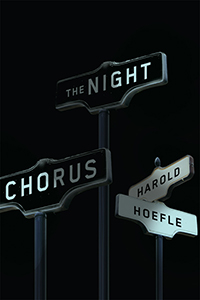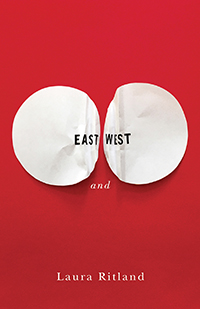Reviews
Poetry Reviews by Kyle Flemmer
Harold Hoefle, The Night Chorus (Montreal: McGill-Queen’s, 2018). Paperbound, 72 pp., $16.95.
Laura Ritland, East and West (Montréal: Signal/Véhicule, 2018). Paperbound, 100 pp., $17.95.
 The Night Chorus is something of a bardic travelogue, cutting across many distinct regions with a song for every town. Hoefle escorts us from dark urban bars down country backroads, through the mountains and forests of Canada, even taking us overseas. “Down the Roads,” a series of poetic snapshots inspired by various streets and byways, best embodies this travelogue spirit; its reprisal at the end feels like a return to familiar territory after a stint abroad. In “Downtown” he observes: “The city was painted toenails / and sweat dripping from chins.” Hoefle’s eye for detail and idiosyncrasy enlivens each of the different settings, especially when describing foreign towns and countries.
The Night Chorus is something of a bardic travelogue, cutting across many distinct regions with a song for every town. Hoefle escorts us from dark urban bars down country backroads, through the mountains and forests of Canada, even taking us overseas. “Down the Roads,” a series of poetic snapshots inspired by various streets and byways, best embodies this travelogue spirit; its reprisal at the end feels like a return to familiar territory after a stint abroad. In “Downtown” he observes: “The city was painted toenails / and sweat dripping from chins.” Hoefle’s eye for detail and idiosyncrasy enlivens each of the different settings, especially when describing foreign towns and countries.
The milieux of The Night Chorus are populated with a variety of odd-ball characters. Some of Hoefle’s most disagreeable characters, like those found in “My Last Badass” and “In the Name of the Father,” veer past documentation into caricature. That said, it is the more bizarre and nuanced portraits that land as well-rounded and humanized, like that of Sally Mander, who murders her parents in “Manning Up” by pushing them off a roof. Distasteful as that may sound, she has a history, motivations, mannerisms, agency, and is transformed by the consequences of her actions. All the best characters exist as they are, without too much editorializing, and The Night Chorus is full of quirky personalities sketched in brief.
Hoefle’s style has a wry, observant worldliness, revealing the seedy, but not unpleasant, underbelly of our everyday lives, often contrasting it with problems faced elsewhere in the world. He repeatedly expresses concern for the plight of the people, friends and strangers alike. This concern is generally well-handled, but “In the Bataclan” stood out as voyeuristic, depicting human misery without making clear what we’re supposed to take from witnessing a mass shooting. Unlike characterization, this situation demands some form of editorial or elegiac perspective. Mere observation reads as shocking for the sake of gravitas, and The Night Chorus cultivates enough of that without it. Take, for example, the tactful approach to the Syrian war in part one of “England”:
Evening sky is still milky blue.
Plodding in sand beyond the Pier,
my soldier-friend talks of Syria,
of barrel bombs—his hand mimes
a chopper’s flight—or the other custom
where the Air Force scores a junky car.
Clamp, climb, drop.
The soldier’s testimony throws the speaker and the joyful parade-goers surrounding them into stark relief, illustrating how Hoefle’s attention to detail can breed an appreciation for those modest, revelatory moments found at the most unexpected crossroads in life.
 Laura Ritland’s debut poetry collection, East and West, deftly navigates a pastiche of cultural and physical spaces. The book, divided into parts named after each of the four cardinal directions, maps in lyric the currents of influence and experience, casting the poet’s discerning eye this way, then that, inwards, then out. Ritland draws disparate viewpoints into dialogue with each other, as the book’s title suggests. East, west, north, and south are more than polar extremes, or discrete zones existing in opposition to each other; they become a multitude of perspectives mediated by an author investigating how history, family, geography, memory, society, ecology, and more, all come together in the present moment to constitute our reality.
Laura Ritland’s debut poetry collection, East and West, deftly navigates a pastiche of cultural and physical spaces. The book, divided into parts named after each of the four cardinal directions, maps in lyric the currents of influence and experience, casting the poet’s discerning eye this way, then that, inwards, then out. Ritland draws disparate viewpoints into dialogue with each other, as the book’s title suggests. East, west, north, and south are more than polar extremes, or discrete zones existing in opposition to each other; they become a multitude of perspectives mediated by an author investigating how history, family, geography, memory, society, ecology, and more, all come together in the present moment to constitute our reality.
East and West is at least a partial accounting of influence, less from anxiety, it seems, than from a genuine sounding of the self. In “Flight Materials,” the speaker tells us: “Entering the terminal’s shipyard, I gave / my secrets to the x-ray and my boots / to the nation.” Migration, orientation, navigation; each requires that you externalize the self and internalize the world in a lyric chiasmus of subject and object. What was private is now public. An important set of questions essential to the lyric mode underlies and brings together Ritland’s poems, otherwise interested in their own particular topics: what does it mean to know and articulate one’s self? to grapple with nature versus nurture? to exist as an individual in this time and place? These are questions of both personal and universal import, and Ritland’s poems serve as a sort of microcosm of Canadian settler lyricism, harmonizing the myriad impressions of the shared, intergenerational experiences of immigrants, or the descendants of immigrants, through the lens of the lyric “I.”
Of course, lyricism is more than a mere accounting of influences and impressions; it is an act of synthesis. There is an undercurrent of tension throughout the book, emerging from the opening epigrams, which suggest that personal orientation with respect to the world is insufficient for a proper understanding of self. “We tried to wear our histories lightly,” Ritland’s speaker claims in “Outpost,” which is to say the forces that have led to our present do not necessarily determine our future. Rather, the act of existing is a generative process. We rediscover our position each day, each moment. We reorient ourselves every time we interact with the world around us, and when looking inward to our memories. In a dizzying, hybridized culture, East and West offers us a gentle reminder to look and listen with compassion, and to build through compromise, negotiation, and transformation.
—Kyle Flemmer









